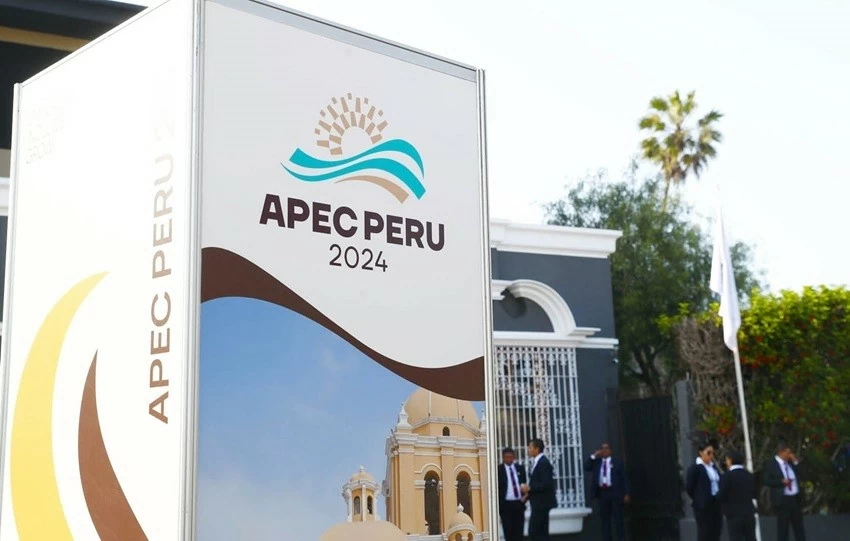
Vietnam stays open, connected, and balanced in APEC cooperation
Latest
 |
| The APEC Peru 2024 will be held from 15 to 16 November. (Photo: Adina) |
Established more than three decades ago, APEC's 21 member economies include the world's three largest ones: the United States, China, and Japan, as well as Australia, Brunei, Canada, Chile, Hong Kong (China), Indonesia, Malaysia, Mexico, New Zealand, Papua New Guinea, Peru, the Philippines, Russia, Singapore, South Korea, Taiwan (China), Thailand, and Viet Nam.
APEC reinforces its position in the "global storm"
APEC is the region's most important multilateral economic and trade cooperation mechanism, accounting for around 62% of GDP and 48% of world commerce in 2021. This forum fosters economic cooperation through non-binding agreements, open debate, consensus-based decision-making, and equitable regard for the perspectives of all member economies. In contrast to the World Trade Organization (WTO) and other multilateral trade organizations, the nonbinding structure has encouraged significant integration aspirations.
Connecting economies, lowering trade barriers, and eliminating regulatory disparities have increased intra-regional commerce, with average tariffs dropping from 17% in 1989 to 5.3% in 2021.
Total regional merchandise trade has grown more than ninefold, outperforming neighboring regions. During this time, trade in goods and services increased at an average yearly pace of 7.1%, nearly doubling GDP growth of 3.7% (Makin & Verikos 2021). Trade development has propelled regional GDP growth from 19 trillion USD in 1989 to 52.8 trillion USD by 2021. Per capita income has risen roughly fourfold.
However, in recent years, APEC has encountered enormous challenges, ranging from trade disputes to the Covid-19 epidemic and conflicts in numerous global hotspots, including the Russia-Ukraine military confrontation and the Israel-Hamas conflict. These events have created an unstable, divided, and fragmented environment, particularly in the trade sector, which has seen a surge of protectionism in the United States and many other countries.
 |
| Dr. Le Ngoc Bich, The Business School, RMIT University Vietnam. (Photo: RMIT) |
The United States wants to reduce its reliance on China and increase investment in allied countries, following the trend of "friendshoring" - when the government encourages corporations to restructure supply chains, shifting output away from geopolitical enemies and toward allied countries. China, on the other hand, is using the "Belt and Road" Initiative to establish a network of African and European commercial partners.
This behavior raises concerns about the risk of decoupling and global trade becoming entangled in the superpower struggle between the United States and China. According to a new research released by the International Monetary Fund (IMF) in 2023, if the globe separates into two different blocs with little or no commerce, global GDP will shrink by more than 1.5%, or almost 1.5 trillion USD.
This reduction might double to more than 3% of GDP in Asia alone, due to the region's economic interdependence. As a result, strengthening dialogue and cooperation is crucial to transform challenges into opportunities, making multilateral forums like APEC matter more than ever.”
“Refreshing” APEC cooperation
While the WTO's global trade laws are becoming outdated as a result of rapid change, APEC has been active in mobilizing government support and resources to produce a WTO reform plan in areas where it is missing, most notably trade in services, investment, and the digital economy.
APEC also plays an essential role in upholding multilateral trade values. Despite the disagreement, both the US and China have interests in the APEC framework. APEC has provided an opportunity to bring the two superpowers to the bargaining table. On the sidelines of APEC 2023 in San Francisco (California), US President Joe Biden met with Chinese General Secretary and President Xi Jinping in a constructive leaders' meeting.
In particular, in the context of a global economic recovery confronted with numerous challenges such as rising inflation, geopolitical tensions, climate change, and pandemics, APEC focuses on promoting sustainable and inclusive development, emphasizing its critical role as a forum for constructive discussions to foster international cooperation.
The 2023 APEC Summit, titled "Creating a Resilient and Sustainable Future for All," addresses a wide range of vital problems, including supply chain resilience, e-commerce, possibilities for small and medium-sized firms, and climate change. Food security, health, anti-corruption, digital transformation, and women's economic empowerment are among the topics under debate.
Looking ahead to the 2024 Summit in Peru, APEC will remain a venue for fostering trust and facilitating challenging debates to address critical shared concerns.
Seize the golden opportunity
APEC contributes significantly to the country's economic development. Currently, more than 80% of Viet Nam's import-export turnover is with APEC markets, more than 80% of total FDI capital in Viet Nam comes from APEC economies, and more than 80% of visitors to Viet Nam are from APEC countries. APEC brings together 15 out of 31 strategic partners, including comprehensive strategic partners who are Viet Nam's primary economic and trade partners. 13 of the 17 free trade agreements (FTAs) that Viet Nam has signed are with APEC members.
Since joining APEC in 1998, Viet Nam has used the cooperation mechanism to not only promote economic integration and attract foreign direct investment (FDI), but also to promote reform, improve institutions and policies, and actively participate and have an equal voice in the process of developing and shaping regional trade rules and agreements.
Viet Nam's engagement in the current context strives to improve efficiency and make the best use of cooperative mechanisms.
In the backdrop of obstacles, Viet Nam currently has an excellent potential to join China as a key regional manufacturing center. To capitalize on this opportunity, Viet Nam must continue to actively participate in APEC projects and initiatives, particularly in the areas of digital transformation, green transformation, sustainable development, and human resource development, in order to position itself as one of the most appealing options under the "China +1" model.
Instead of just adhering to international agreements, the Vietnamese government should have a flexible and responsive approach to policymaking in order to respond to rapid market developments. At the same time, there must be close coordination between the government and enterprises.
Drawing on the successful models of Japan, South Korea, and China, the Vietnamese government should implement support programs, invest in education and technology infrastructure, establish high-tech zones, and strengthen ties between the government, universities, and businesses in order to focus on digital transformation and innovation development. This will boost Viet Nam's standing in the global arena and establish the groundwork for Viet Nam to engage in larger playgrounds and next-generation, high-standard free trade agreements (FTA).
APEC is not only a forum for promoting multilateral cooperation, but it is also an essential route for Viet Nam to improve bilateral relations, resulting in long-term and significant benefits for major strategic partners. Furthermore, Viet Nam can use APEC to foster strategic connections with future APEC members such as Bangladesh, Colombia, Costa Rica, and Ecuador. Cooperation with potential Latin American members not only provides access to new markets, but also fosters conversation and cooperation among developing countries.
By taking the right steps to stay open, connected, and balanced within the APEC cooperation framework, Vietnam can foster collaboration, enhance competitiveness, promote integration, and strengthen internal resilience, ensuring long-term sustainable growth.”
























